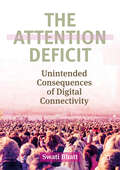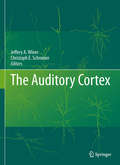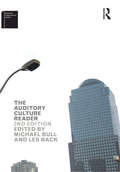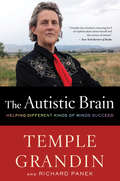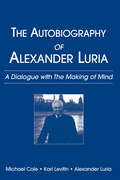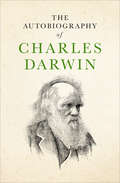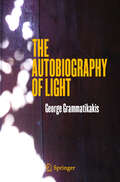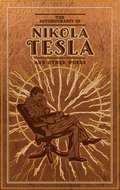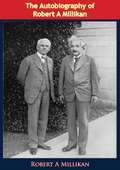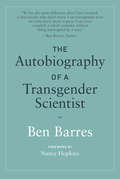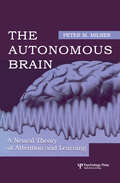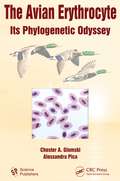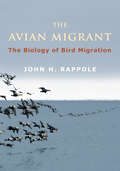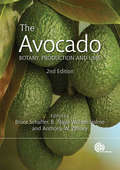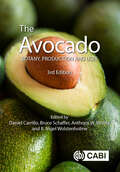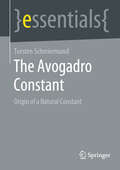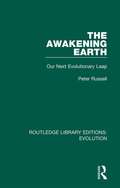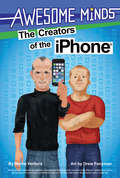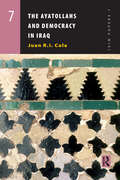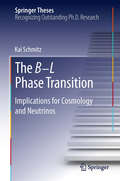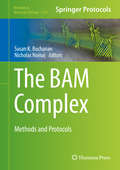- Table View
- List View
The Attention Deficit: Unintended Consequences of Digital Connectivity
by Swati BhattDigital technology has enabled connectivity on an unimagined scale. Human beings are social animals and economic activity promotes this socialization. Market transactions are based on optimism about the future, faith that the world is good and trust that growth is organic or coming from within the system. Individuals therefore invest in the future by having children, by extending credit and accepting risk, and by building connections with others in the sincere expectation of this connectivity being reciprocated. This book explores the unintended consequences of ubiquitous connectivity. The first effect is captured by the sharing model. Technology offers multiple avenues for sharing experiences and personal information, so active engagement with this increased content uses mental effort. Connection inevitably leads to comparisons with other groups and individuals, so despite the benefits of affirmation and group inclusion, these links corrode social networks, leading to depression and mental apathy. The second effect--the result of the commercialization of sharing--is encapsulated in the attention deficit model. Loss of self-worth, driven by the first effect, encourages further connectivity and sharing as buyers seek more comfort and reassurance via social media, paying with time and personal information. The product is digital content and the payment is with time and data. Correspondingly, social media fulfills this demand with exuberance, both via user-generated content and commercially curated content. We are overwhelmed with even more information, paying with increasingly scarce time and attention. Finally, the third and most consequential effect is diminished risk taking. Attention scarcity, as a consequence of the content tsunami, throttles cognitive effort, impairing judgment and decision-making. So the safe bet may be to do nothing . . . take no risks and no gambles. Weaving together the latest research on economics, psychology, and neuroscience, this book fills a void for readers wanting a smart, clear analysis of communications markets and the commercialization of Internet-inspired connectivity.
The Auditory Cortex
by Christoph E. Schreiner Jeffery A. WinerThere has been substantial progress in understanding the contributions of the auditory forebrain to hearing, sound localization, communication, emotive behavior, and cognition. The Auditory Cortex covers the latest knowledge about the auditory forebrain, including the auditory cortex as well as the medial geniculate body in the thalamus. This book will cover all important aspects of the auditory forebrain organization and function, integrating the auditory thalamus and cortex into a smooth, coherent whole. Volume One covers basic auditory neuroscience. It complements The Auditory Cortex, Volume 2: Integrative Neuroscience, which takes a more applied/clinical perspective.
The Auditory Culture Reader (Sensory Formations)
by Michael BullThe first edition of The Auditory Culture Reader offered an introduction to both classical and recent work on auditory culture, laying the foundations for new academic research in sound studies. Today, interest and research on sound thrives across disciplines such as music, anthropology, geography, sociology and cultural studies as well as within the new interdisciplinary sphere of sound studies itself. This second edition reflects on the changes to the field since the first edition and offers a vast amount of new content, a user-friendly organization which highlights key themes and concepts, and a methodologies section which addresses practical questions for students setting out on auditory explorations. All essays are accessible to non-experts and encompass scholarship from leading figures in the field, discussing issues relating to sound and listening from the broadest set of interdisciplinary perspectives. Inspiring students and researchers attentive to sound in their work, newly-commissioned and classical excerpts bring urban research and ethnography alive with sensory case studies that open up a world beyond the visual. This book is core reading for all courses that cover the role of sound in culture, within sound studies, anthropology, sociology, cultural studies, history, media studies and urban geography.
The Augmented Spherical Wave Method
by Volker EyertThe Augmented Spherical Wave (ASW) method is one of the most powerful approaches to handle the requirements of finite basis sets in DFT calculations. It is particularly suited for the calculation of the electronic, magnetic, and optical properties of solid-state materials. Recent developments allow application, in addition, to the elastic properties and phonon spectra. Due to the localized nature of the ASW basis set these properties can be easily interpreted in terms of atomic-like orbitals. The book addresses all those who want to learn about methods for electronic structure calculations and the ASW method in particular. This new edition has been thoroughly revised and extended. In particular, a chapter on the new, both very efficient and accurate spherical-wave based full potential ASW method has been added.
The Autistic Brain: Thinking Across the Spectrum
by Temple Grandin Richard PanekA cutting-edge account of the latest science of autism, from the best-selling author and advocate When Temple Grandin was born in 1947, autism had only just been named. Today it is more prevalent than ever, with one in 88 children diagnosed on the spectrum. And our thinking about it has undergone a transformation in her lifetime: Autism studies have moved from the realm of psychology to neurology and genetics, and there is far more hope today than ever before thanks to groundbreaking new research into causes and treatments. Now Temple Grandin reports from the forefront of autism science, bringing her singular perspective to a thrilling journey into the heart of the autism revolution.Weaving her own experience with remarkable new discoveries, Grandin introduces the neuroimaging advances and genetic research that link brain science to behavior, even sharing her own brain scan to show us which anomalies might explain common symptoms. We meet the scientists and self-advocates who are exploring innovative theories of what causes autism and how we can diagnose and best treat it. Grandin also highlights long-ignored sensory problems and the transformative effects we can have by treating autism symptom by symptom, rather than with an umbrella diagnosis. Most exciting, she argues that raising and educating kids on the spectrum isn't just a matter of focusing on their weaknesses; in the science that reveals their long-overlooked strengths she shows us new ways to foster their unique contributions.From the "aspies" in Silicon Valley to the five-year-old without language, Grandin understands the true meaning of the word spectrum. The Autistic Brain is essential reading from the most respected and beloved voices in the field.
The Autobiography of Alexander Luria: A Dialogue with The Making of Mind
by Michael Cole Karl Levitin Alexander R. LuriaAlexander Luria was one of the most influential psychologists of the 20th century. His official autobiography was written as a citizen of the Soviet Union, and while it provides a compelling story of his lifelong devotion to developing a comprehensive theory of the biological and cultural foundations of human nature, it is conspicuous for the absence of information about the social context of his work and his personal struggles to be a decent person in indecent times. The current "dialogic autobiography" brings the vitality of Luria's ideas back to life. Michael Cole and Karl Levitin, both of whom knew Luria well and have written about his life and work, have written a carefully researched introduction and epilogue to the original autobiography. They provide readers, for the first time, with information about the social and personal contexts of Luria's remarkable achievements. Their account is supplemented by downloadable resources with reminiscences of leading psychologists from around the world who knew and worked with Luria. At last, Luria's life and science are brought together in a single volume.The book will appeal to psychologists, neuropsychologists, and other scientists interested in Luria's life achievements.
The Autobiography of Charles Darwin: Super Large Print Edition Of The Classic Memoir For Low Vision Readers (Barnes And Noble Library Of Essential Reading Series)
by Charles DarwinThis edition of Darwin&’s life story restores previously censored passages on religion and the scientist&’s opinions of his contemporaries. Darwin wrote his autobiography in 1876, at the age of sixty-seven, hoping it would prove interesting to his children and grandchildren. Preparing the book for a wider audience, his family initially sought to protect his legacy by removing passages they found too personal or controversial. This restored edition, which appeared one hundred years after the publication of On the Origin of Species, was edited by Darwin&’s own granddaughter Nora Barlow, who wished to share the text as it originally existed in her family&’s archives. Shedding light on the women in Darwin&’s life and his evolving views on religion, The Autobiography of Charles Darwin delves deep into his brilliant yet shy and reclusive personality, from his childhood love of nature to the reception of his groundbreaking theories on evolution. It also includes previously unpublished notes and letters on family matters, as well as Darwin&’s dispute with Samuel Butler.
The Autobiography of Light
by George GrammatikakisThis book brings to life one of the most fundamental entities in the universe: the electromagnetic waves that we perceive as light. With his gift for narrative, the author explains the nature of light and the long history of its influence on human ideas, technology and culture. From early efforts to understand vision and colours, through relativity and quantum theory, visual art and laser technology to the birth of stars and attempts to photograph their end, readers will come to appreciate the central role of light not only in human history, but also in the history of the cosmos. This grand tour ends in a flourish, with an epilogue written in the first person by the protagonist itself: a true Autobiography of Light. All chapters in the book are relatively self-contained, allowing readers to dip freely in and out. What makes this captivating story so original is the effort made to point out the affinity between the study of light and achievements in the realm of culture.
The Autobiography of Nikola Tesla and Other Works (Leather-bound Classics)
by Thomas Commerford Martin Nikola TeslaWho was Nikola Tesla? Find out in this comprehensive volume that includes Tesla&’s autobiography and scientific writings, as well as other works that examine his life and career in detail.Nikola Tesla came from a humble upbringing in what is now Croatia and reached the heights of science and technology in the United States at the turn of the twentieth century. The Autobiography of Nikola Tesla and Other Works gives readers a compelling insight into the man whose ideas revolutionized the fields of electrical and mechanical engineering, and who continues to be a source of inspiration for modern inventors. This volume includes Tesla&’s autobiography My Inventions (1919), articles and diagrams that he published in scientific magazines—including &“The Problem of Increasing Human Energy,&” in which he discusses the potential of solar power—and Thomas Commerford Martin&’s The Inventions, Researches, and Writings of Nikola Tesla. A scholarly introduction examines Tesla&’s life and career, and the impact that he has had on generations of inventors up to the present day.
The Autobiography of Robert A Millikan
by Robert A. MillikanRobert Millikan tells his story in his own words. “This book represents an effort to record and appraise some of the changes which have come under the eyes of one particular observer of the rapidly changing scene. I shall begin, however, in 1825, some forty years before my birth.”“The Autobiography of Robert A. Millikan is one of the most outstanding works of its kind done by an American man of science. The treatment is lucid and brings out in clear relief not only the activities of the man himself but of those, and there are many, with whom he has associated and collaborated in the fields of teaching, research, and administration. The autobiography is that of a dynamic personality associated with patience, persistence and enthusiasm. The treatment is free from egotism and refreshingly frank and forthright.” — B. J. Spence, American Journal of Physics“Robert Andrews Millikan is one of the most distinguished physicists in the world and his autobiography will interest not only the entire scientific world, but the reading public at large... It is refreshing and helpful for younger [scientific] workers to read... that only after many discouraging attempts did [Millikan’s] great researches on the determination of the electronic charge and his proof of the Einstein photoelectric law emerge.” — Robert S. Shankland, Physics Today“It is seldom that a man is so successful in getting his personality into his own writing about himself... The book is much more than the record of the life of one man,... it is a history of the physics of his time, and as such will find its place among the other histories of the most memorable decades that physics has yet experienced.” — P. W. Bridgman, Science
The Autobiography of a Transgender Scientist (The\mit Press Ser.)
by Ben BarresA leading scientist describes his life, his gender transition, his scientific work, and his advocacy for gender equality in science.Ben Barres was known for his groundbreaking scientific work and for his groundbreaking advocacy for gender equality in science. In this book, completed shortly before his death from pancreatic cancer in December 2017, Barres (born in 1954) describes a life full of remarkable accomplishments—from his childhood as a precocious math and science whiz to his experiences as a female student at MIT in the 1970s to his female-to-male transition in his forties, to his scientific work and role as teacher and mentor at Stanford. Barres recounts his early life—his interest in science, first manifested as a fascination with the mad scientist in Superman; his academic successes; and his gender confusion. Barres felt even as a very young child that he was assigned the wrong gender. After years of being acutely uncomfortable in his own skin, Barres transitioned from female to male. He reports he felt nothing but relief on becoming his true self. He was proud to be a role model for transgender scientists.As an undergraduate at MIT, Barres experienced discrimination, but it was after transitioning that he realized how differently male and female scientists are treated. He became an advocate for gender equality in science, and later in life responded pointedly to Larry Summers's speculation that women were innately unsuited to be scientists. Privileged white men, Barres writes, “miss the basic point that in the face of negative stereotyping, talented women will not be recognized.” At Stanford, Barres made important discoveries about glia, the most numerous cells in the brain, and he describes some of his work. “The most rewarding part of his job,” however, was mentoring young scientists. That, and his advocacy for women and transgender scientists, ensures his legacy.
The Automaton in English Renaissance Literature (Literary and Scientific Cultures of Early Modernity)
by Wendy Beth HymanThe Automaton in English Renaissance Literature features original essays exploring the automaton-from animated statue to anthropomorphized machine-in the poetry, prose, and drama of England in the 16th and 17th centuries. Addressing the history and significance of the living machine in early modern literature, the collection places literary automata of the period within their larger aesthetic, historical, philosophical, and scientific contexts. While no single theory or perspective conscribes the volume, taken as a whole the collection helps correct an assumption that frequently emerges from a post-Enlightenment perspective: that these animated beings are by definition exemplars of the new science, or that they point necessarily to man's triumphant relationship to technology. On the contrary, automata in the sixteenth and seventeenth centuries seem only partly and sporadically to function as embodiments of an emerging mechanistic or materialist worldview. Renaissance automata were just as likely not to confirm for viewers a hypothesis about the man-machine. Instead, these essays show, automata were often a source of wonder, suggestive of magic, proof of the uncannily animating effect of poetry-indeed, just as likely to unsettle the divide between man and divinity as that between man and matter.
The Autonomous Brain: A Neural Theory of Attention and Learning
by Peter M. MilnerThe behaviorist credo that animals are devices for translating sensory input into appropriate responses dies hard. The thesis of this pathbreaking book is that the brain is innately constructed to initiate behaviors likely to promote the survival of the species, and to sensitize sensory systems to stimuli required for those behaviors. Animals attend innately to vital stimuli (reinforcers) and the more advanced animals learn to attend to related stimuli as well. Thus, the centrifugal attentional components of sensory systems are as important for learned behavior as the more conventional paths. It is hypothesized that the basal ganglia are an important source of response plans and attentional signals. This reversal of traditional learning theory, along with the rapid expansion of knowledge about the brain, especially that acquired by improved techniques for recording neural activity in behaving animals and people, makes it possible to re-examine some long standing psychological problems. One such problem is how the intention to perform an act selects sensory input from relevant objects and ensures that it alone is delivered to the motor system to control the intended response. This is an aspect of what is sometimes known as the binding problem: how the different features of an observed object are integrated into a unified percept. Another problem that has never been satisfactorily addressed is how the brain stores information concerning temporal order, a requirement for the production of most learned responses, including pronouncing and writing words. A fundamental process, the association between brain activities representing external events, is surprisingly poorly understood at the neural level. Most concepts have multiple associations but the concept is not unduly corrupted by them, and usually only a single appropriate association is aroused at a time. Furthermore, any arbitrary pair of concepts can be instantly associated, apparently requiring an impossibly high degree of neural interconnection. The author suggests a substitute for the reverberating closed neuronal loop as an explanation for the engram (active memory trace or working memory), which may go some way to resolving these difficulties. Shedding new light on enduring questions, The Autonomous Brain will be welcomed by a broad audience of behavioral and brain scientists.
The Avian Erythrocyte: Its Phylogenetic Odyssey
by Chester A. Glomski Alessandra PicaThe erythrocyte presents morphologic, cytochemical, and quantitative adaptations as it progresses through its evolutionary continuum. This text is a comprehensive exploration of the evolutionary relationship of the avian erythrocyte with the erythrocytes of the antecedent lower vertebrates-such as amphibians and reptiles-as well as mammalians. It a
The Avian Migrant: The Biology of Bird Migration
by John RappoleThe purpose of migration, regardless of the distance involved, is to exploit two or more environments suitable for survival or reproduction over time, usually on a seasonal basis. Yet individual organisms can practice the phenomenon differently, and birds deploy unique patterns of movement over particular segments of time. Incorporating the latest research on bird migration, this concise, critical assessment offers contemporary readers a firm grasp of what defines an avian migrant, how the organism came to be, what is known about its behavior, and how we can resolve its enduring mysteries. <P><P>John H. Rappole's sophisticated survey of field data clarifies key ecological, biological, physiological, navigational, and evolutionary concerns. He begins with the very first migrants, who traded a home environment of greater stability for one of greater seasonality, and uses the structure of the annual cycle to examine the difference between migratory birds and their resident counterparts. He ultimately connects these differences to evolutionary milestones that have shaped a migrant lifestyle through natural selection. Rather than catalogue and describe various aspects of bird migration, Rappole considers how the avian migrant fits within a larger ecological frame, enabling a richer understanding of the phenomenon and its critical role in sustaining a hospitable and productive environment. Rappole concludes with a focus on population biology and conservation across time periods, considering the link between bird migration and the spread of disease among birds and humans, and the effects of global warming on migrant breeding ranges, reaction norms, and macroecology.
The Avocado: Botany, Production and Uses (Botany, Production and Uses)
by Peter Hofmann Richard Litz Jonathan Crane André Ernst Carlos Balerdi Alejandro Barrientos Priego Mary Arpaia Ben Faber Rodrigo López-Gómez Uri Lavi Elizabeth Dann Andre Chanderbali Pilar Gil Lindy Coates Mark Hoddle Edward Evans Derek Donkin Carol Lovatt Greg Douhan Emanuel Lahav Victor Albert John Bower Jay Bost Martín Aluja Lauren Garner Araceli Barceló-Muñoz Gary BenderAlthough the avocado has been cultivated and consumed for more than 9000 years in its native Latin America, world production and trade have only developed over the past few decades, and now exceed 3.5 million tonnes. The avocado is now widely traded between warmer and colder countries as a result of the global community becoming increasingly aware of its versatility and nutritional value. For the past decade, the global avocado industry has been going through a period of rapid technological change and innovation. The dietary value of 'the most nutritious of all fruit' is also receiving more attention.
The Avocado: Botany, Production and Uses (Botany, Production and Uses)
by Bruce Schaffer Daniel Carrillo Anthony W. Whiley B. Nigel WolstenholmeThe avocado industry is evolving rapidly. Avocado production has almost doubled recently, with significant expansion in areas planted, especially in Latin America, but also in Africa and Asia. Moreover, the global demand for avocado keeps on growing. The Avocado, 3rd edition is a unique and comprehensive source of information for avocado researchers, and covers everything from the history and distribution, novel agronomic practices, ecological and climatic requirements, and emerging diseases and pest problems. It compiles state-of-the-art information to promote more sustainable production systems and better preparedness to face the challenges that will shape the future of avocado production. This fully updated third edition includes many new international contributors especially from those regions with active and expanding avocado industries. Considering the expansion in avocado consumption, it also includes a new chapter on avocado uses and human nutrition. This is a valuable resource for avocado researchers, academicians and students of horticulture and botany, advisers, professional growers and practitioners in the industry.
The Avogadro Constant: Origin of a Natural Constant (essentials)
by Torsten SchmiermundIn May 2019, the new SI definitions for amps, kilograms, kelvins and moles came into force. For the mole, the SI unit of the amount of substance, the Avogadro constant was redefined and its value was set as the defining constant. But: How did it come about that a comparative number became a natural constant? Embark on a short journey from the beginnings to the present day: From the gas laws of the 17th century to the new SI system of units of the 21st century. Get to know the meaning of the natural constants in general and the Avogadro constant in particular. Get an overview of the term “mole” and find out which (exemplary) methods can be used to determine the Avogadro constant.
The Awakening Earth: Our Next Evolutionary Leap (Routledge Library Editions: Evolution #11)
by Peter RussellOriginally published in 1982 The Awakening Earth explores the idea of the Earth as a collective, self-regulatory living organism, and considers in this context, the function of the human race. The book provides an exploration of humanity’s potential and explores the possibility of mankind’s evolutionary future. Drawing on the work of physicists, psychologists, philosophers and mystics, the book argues that humanity is on the verge of another evolutionary leap and explores evolution in the context of spiritual growth, arguing that widespread inner awakenings could lead to a more analogous society, functioning as a single social super-organism, much in the way cells in a body function as a biological organism.
The Awesome Minds: The Creators of the iPhone® (Awesome Minds)
by Marne Ventura Drew FeynmanThe iPod, iPhone, and iPad changed the way we communicate, play, learn, and work. This wouldn't have been possible without the amazing minds of Steve Jobs and his inventive team. With full-color illustrations and lively text, and chock-full of interesting facts, Awesome Minds: The Creators of the iPhone® tells the true story of these life-changing devices. It is the perfect read for those with creative spirits and curious minds. Lexile Level 850L This book is an independently authored and published biography of the inventors of the iPhone® mobile device and is not sponsored or endorsed by or affiliated in any way with these individuals, their families, and/or Apple Inc.
The Axis Vertebra
by Demetrios S. KorresThe axis (second cervical) vertebra is of special interest owing to its particular anatomy, biomechanics, and position in the spine. Despite this, the role of the axis in the function of the cervical spine and the nature of its involvement in trauma and other pathological conditions are still not completely understood. This book covers all aspects of the axis vertebra and its disorders. Embryologic development, normal anatomy, and biomechanics of the axis and upper cervical spine are first discussed, and imaging appearances explained with the aid of standard radiographs and images obtained using advanced techniques. Congenital anomalies, fractures, infections, and tumors (benign and malignant) are then discussed in depth in individual sections. The book is based on the personal experience and expertise of the contributing authors, enhanced by up-to-date information drawn from the literature, and will appeal to a range of practitioners.
The Ayatollahs and Democracy in Contemporary Iraq (ISIM Papers)
by Juan ColeIraqi Shiism is undergoing profound changes, leading to new elaborations of the relationship between clerics and democratic principles in an Islamic state. The Najaf tradition of thinking about Shiite Islam and the modern state in Iraq, which first developed during the Iranian constitutional revolution of 1905–1911, rejects the principle that supreme power in an Islamic state must be in clerical hands. Grand Ayatollah Ali Sistani of Iraq stands in this tradition, and he has striven to uphold and develop it since the fall of Saddam Hussein. At key points he came into conflict with the Bush administration, which was not eager for direct democracy. Parliamentary politics have also drawn in clerics of the Dawa Party, the Sadr movement, and the Supreme Council for Islamic Revolution in Iraq, all of which had earlier been authoritarian in outlook. Is Iraqi Shiism experiencing its enlightenment moment? This text offers a seminal analysis of the most recent developments in Iraqi Shiism.
The B--L Phase Transition
by Kai SchmitzSeveral of the very foundations of the cosmological standard model -- the baryon asymmetry of the universe, dark matter, and the origin of the hot big bang itself -- still call for an explanation from the perspective of fundamental physics. This work advocates one intriguing possibility for a consistent cosmology that fills in the theoretical gaps while being fully in accordance with the observational data. At very high energies, the universe might have been in a false vacuum state that preserved B-L, the difference between the baryon number B and the lepton number L as a local symmetry. In this state, the universe experienced a stage of hybrid inflation that only ended when the false vacuum became unstable and decayed, in the course of a waterfall transition, into a phase with spontaneously broken B-L symmetry. This B-L Phase Transition was accompanied by tachyonic preheating that transferred almost the entire energy of the false vacuum into a gas of B-L Higgs bosons, which in turn decayed into heavy Majorana neutrinos. Eventually, these neutrinos decayed into massless radiation, thereby producing the entropy of the hot big bang, generating the baryon asymmetry of the universe via the leptogenesis mechanism and setting the stage for the production of dark matter. Next to a variety of conceptual novelties and phenomenological predictions, the main achievement of the thesis is hence the fascinating notion that the leading role in the first act of our universe might have actually been played by neutrinos.
The BAM Complex
by Susan K. Buchanan Nicholas NoinajThis volume is comprised of a collection of experimental protocols for common techniques and strategies used to study the biogenesis of b-barrel outer membrane proteins in Gram-negative bacteria. The BAM Complex: Methods and Protocols guides readers through methods on the function of the BAM complex, the roles played by each of the individual components, the expression and purification of the components, crystallization and structure determination of the components, and how the individual Bam components may assemble into a functional complex. Written in the highly successful Methods in Molecular Biology series format, chapters include introductions to their respective topics, lists of the necessary materials and reagents, step-by-step, readily reproducible laboratory protocols, and tips on troubleshooting and avoiding known pitfalls. Authoritative and cutting-edge, The BAM Complex: Methods and Protocols will serve as an invaluable reference for those interested in studying the BAM complex.
